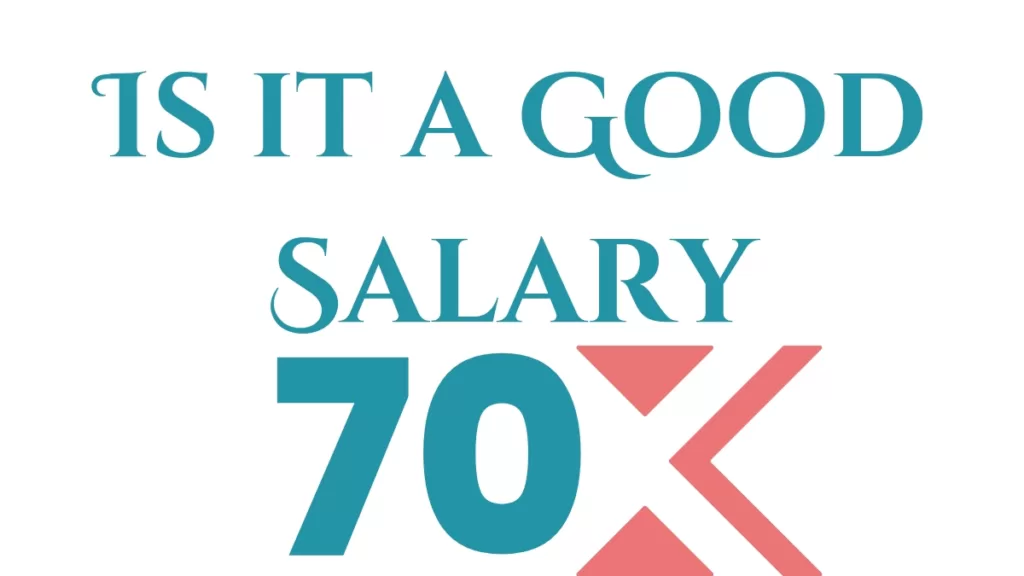Navigating the waters of personal finance can be as perplexing as trying to solve a Rubik’s cube blindfolded. One minute, you’re up; the next, you’re wondering how far your paycheck can stretch. In the midst of all this financial flux, many wonder if a $70,000 salary is the golden ticket to comfort and stability. Let’s dive into this intriguing question is 70k a good salary? and unlock the mysteries behind the numbers.
Understanding The Median Income Benchmark
A $70,000 Salary and The U.S. Median Income
Before we unpack the suitcase of financial wisdom, let’s establish a baseline. According to recent data, the median household income in the United States hovers around $68,000. If your earnings are hitting the $70,000 mark, congratulations, you’ve just edged past the median annual income for both individuals and households in the US, making it a good salary by that standard. But what does that really mean?
Median vs. Mean Income: A Brief Overview
Let’s clear the air on some statistical jargon. You’ve likely heard the terms ‘median’ and ‘mean’ income tossed around like a hot potato. The median income, which we’ve mentioned, represents the middle point of all salaries in a field, with half earning less and half more. This makes it a trusty compass for navigating the landscape of earnings.
On the flip side, the mean income averages all salaries, but can be swayed by the weight of high or low outliers. Imagine one billionaire in a village of farmers—the average (mean) income would skyrocket, but it wouldn’t tell you much about what most villagers earn. That’s where the median provides a more grounded perspective.
The Happiness Income Threshold
Is $75,000 The Magic Number?
In the quest for financial contentment, $75,000 has often been cited as the “happiness threshold,” a term popularized by a study from Princeton University’s Woodrow Wilson School. The premise is simple: up to that point, more money translates to more happiness. However, after that threshold, the happiness curve flattens like a pancake. So, sitting pretty close at $70,000, you might be just a stone’s throw away from peak monetary joy.
The Diminishing Returns of Income on Happiness
Imagine filling a glass with water—the first few ounces quench your thirst, but as it nears the brim, each additional drop seems less refreshing. Similarly, every dollar you earn up to a certain point has a significant impact on your well-being. But after crossing the happiness threshold, the extra cash starts to drip down the sides, offering little additional satisfaction.
Location, Location, Location: The Cost of Living Factor
How Far Can $70,000 Stretch?
Think of your salary as a rubber band. In some places, it’ll stretch far enough to secure a bundle of financial security and comfort. In others, it might snap under the pressure of high living costs. A $70,000 salary in a city like San Francisco might have you living paycheck to paycheck, but in a more affordable area, it could mean a spacious home and money to spare for vacations and savings.
Regional Variations in Cost of Living
To put it in perspective, let’s play a game of “salary musical chairs.” The same $70,000 that gets you a modest apartment in New York City could land you a palatial residence in a smaller town like Cedar Rapids, Iowa. This disparity is due to the vast differences in the cost of housing, groceries, transportation, and other essentials across various locations.
Work-Life Balance and Earning More
The Trade-Off Between Money and Time
Picture your work-life balance as a seesaw. On one end sits your $70,000 salary, and on the other, your personal time. Earning more than $70,000 might tempt you to add weight to the money side, but beware—it could send your free time flying into the air. The pursuit of a higher salary often comes with longer hours or more responsibility, which could tilt the seesaw and leave your work-life balance hanging by a thread.
Finding Your Sweet Spot
It’s like tuning a guitar—if the tension on the strings is too high, they’ll snap; too low, and the music falls flat. Similarly, adjusting your work commitments and salary to find the right harmony can keep the melody of life playing sweetly.
The Role of Education and Experience
Climbing The Salary Ladder
As you scale the cliffs of your career, $70,000 might be a ledge you rest on, catching your breath before the next climb. Education and experience are the ropes and harnesses that help you ascend to higher earnings. A bachelor’s degree might get you to that $70,000 vista, while a master’s or years of experience could hoist you to even loftier salary peaks.
The Impact of Your Field
Let’s not forget that your career field acts like the weather on your climb—a sunny day in tech can mean smooth scaling, while a stormy afternoon in the arts might require more grit to reach that $70,000 ledge. The median income is a trusty guide here, helping you gauge the typical earnings in your field and set realistic expectations.
The Influence of Debt and Financial Obligations
When $70,000 Feels Like Less
Imagine your salary as a pie. If debt and financial obligations take a large slice, you’re left nibbling on the crumbs. Student loans, credit card debt, or a hefty mortgage can make a $70,000 salary feel much less substantial, as more of your earnings go towards paying off these debts instead of funding your lifestyle or savings.
Budgeting: Making The Most of Your Salary
Crafting a budget is like drawing a treasure map—it helps you navigate your finances and uncover the hidden gems within your $70,000 salary. By allocating funds wisely and reducing debt, you can maximize the value of your earnings and perhaps even save a doubloon or two for future adventures.
The Future of $70,000 Salaries
Inflation and The Value of Money
Like a balloon gradually losing air, the purchasing power of $70,000 can deflate over time due to inflation. What feels comfortable today might be tight tomorrow. It’s crucial to keep an eye on the inflation rates and adjust your financial plans accordingly, ensuring your salary keeps pace with the cost of living.
Career Advancement and Raises
Climbing the corporate ladder isn’t just good for the view—it can also mean a higher salary. Staying proactive in your career, seeking out professional development opportunities, and negotiating raises can help ensure that your $70,000 salary grows with you, allowing you to maintain or improve your standard of living.
Navigating Taxes and Deductions
Understanding The Take-Home Pay
It’s important to remember that the $70,000 figure is often a pre-tax amount. Like a cake before it’s sliced, the gross salary looks much larger before the taxman comes with his knife. Federal, state, and local taxes, along with other deductions, will carve out a portion of your earnings, altering the size of your take-home pay.
Smart Tax Planning
Strategizing your taxes is akin to a game of chess—anticipate moves and position yourself advantageously. Making use of tax deductions, credits, and retirement savings plans can help you protect more of your salary from taxation, keeping more money in your pocket.
Personal Financial Goals and $70,000
Aligning Salary With Aspirations
Your financial goals are like destinations on a road trip—some are just down the street, while others are across the country. A $70,000 salary can be the vehicle that drives you to various milestones, whether that’s buying a home, starting a family, or traveling the world. Aligning your earnings with your aspirations is key to a fulfilling journey.
Savings and Investment Strategies
Imagine your salary as seeds. Planting them in the fertile soil of savings and investments can grow a lush garden of financial security. With a $70,000 salary, you have the potential to cultivate a robust financial future by contributing to retirement accounts, investing in the stock market, and building an emergency fund.
Conclusion: Is 70K a Good Salary
In the grand theatre of life, a $70,000 salary can be a star performer or a supporting role, depending on the script of your personal circumstances. It surpasses the median income in the US and flirts with the happiness threshold, offering a comfortable life in many cases. However, factors like location, work-life balance, financial obligations, and personal goals all play a part in determining how richly this salary contributes to the narrative of your life.
As you move through the acts, remember that financial planning, career development, and a bit of tax wizardry can help ensure that your $70,000 salary remains a headliner. And with the spotlight shining on your financial decisions, you can take a bow, knowing you’ve crafted a life that’s not just good, but truly yours.
FAQs
Is $70,000 a year considered a good salary?
$70,000 a year is considered a good salary compared to the median household income in the United States, which is around $68,000. However, whether it’s “good” also depends on factors such as cost of living, personal financial goals, and individual circumstances.
Can you live comfortably on a $70,000 salary?
Yes, many people can live comfortably on a $70,000 salary, especially in areas with a lower cost of living. Comfort also depends on one’s lifestyle, financial obligations, and effective budgeting.
Will making $70,000 a year allow me to save money?
Making $70,000 a year can allow for savings, provided you manage your finances well, budget effectively, and keep debt under control. It’s also important to align your spending with your savings goals.
How does the cost of living affect the value of a $70,000 salary?
The cost of living can significantly affect how far a $70,000 salary goes. In high-cost areas, the same salary may only cover basic expenses, while in more affordable regions, it may allow for a more luxurious lifestyle and savings.
Should I negotiate for more than a $70,000 salary?
It’s always worth negotiating your salary based on your value, experience, and the job market. If you believe your skills and experience warrant more than $70,000, or if you know the market rate for your position is higher, it’s reasonable to negotiate for a higher salary.


